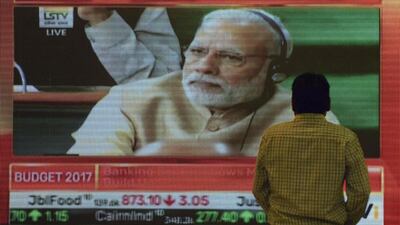This week’s Indian budget marks a judicious approach to policymaking; its merger with the railway budget, its advancement by a month and the discontinuation of segregation of plan and non-plan expenditure make it momentous. The coherent focus on inclusive growth and socio-economic development usher in a strengthened growth agenda for the coming years.
Budget 2017 focused on infrastructure, including digital infrastructure, increasing consumption and strengthening the social sector and safety net including health and education.
The government’s plans for the coming fiscal year display an intent to achieve a steady balance between fiscal responsibility and directional expenditure. The key feature of the budget appears to be several declared deadlines for outcomes such as elimination of tuberculosis by 2025 and removal of unmanned crossings in railways by 2019. This makes the budget more accountable and its impact and progress can be tracked over a period of time.
The budget also has some surprising components such as electoral bonds, issued by political parties to investors. This is expected to help infuse transparency to political funding.
With rising global downside risks including oil price volatility and increasing deglobalisation, it is imperative for the government to amplify its non-tax revenues (through measures including disinvestment and asset recycling).
Infrastructure is key for India’s economic development and thus receives continuous support from the government, with the current budget allocating 3.96 trillion rupees (Dh215.9 billion) for it. Increased investment in areas with high multiplier effects is more likely to boost job creation, something that the Indian economy needs now.
Allowing private players to operate and maintain airports in Tier 2 cities such as Surat and Indore through public private partnerships might improve the efficiency of such airports. Meanwhile monetising land owned by airports operated by Airport Authority of India could contribute to the revenues of those airports.
Providing internet connectivity for as many Indians as possible is one of the preconditions for the successful take-off of the Digital India programme. The BharatNet Project, a nationwide broadband programme, plays a pivotal role in this task. To expedite its implementation, the finance minister, Arun Jaitley, has provided a boost to this programme in terms of increased allocation (100bn rupees).
With the economy slowing due to the government’s demonetisation policy, the expectation was that the finance minister would not stick to the 3 per cent deficit target set earlier for the next financial year. Thus his decision to marginally increase the fiscal deficit target to 3.2 per cent, capitalising on the escape clause provided by the committee entrusted with the task of reviewing fiscal responsibility and budget management, is not seen as a surprise.
Moreover, the finance minister has reiterated his commitment to gradual fiscal consolidation while pledging not to use the escape clause again. So the modest increase in the fiscal deficit target might not result in a substantial change in rating agencies’ view on India.
The need for enhancing India’s strategic oil reserve capacity has been compelling, especially as the country’s oil consumption has been on the rise. In this context, the proposal to establish two more strategic oil reserves, in Odisha and Bikaner in Rajasthan, is a welcome step. Consolidating domestic oil companies, as proposed by the budget, would create a financially sound oil public sector unit, which could in turn take on global oil rivals.
India has experienced high FDI inflow momentum, receiving USD21.6 billion during April-September 2016 (an increase of 30 per cent over the same period a year earlier). The finance minister’s decision to phase out the foreign investment promotion board, together with the indication of more FDI liberalisation, is likely to uplift that momentum.
While the new scheme to build infrastructure at the state level has the potential to lower costs for export units, the low income tax rate could be a boon for small businesses.
Agriculture has rightfully been a prime focal point. The allocation of 10tn rupees, if channelled into digitising financing bodies while integrating them, as well as irrigation funds, might mark a year of much-needed change for the sector. The thrust for rural infrastructure will complement agriculture’s revival. Creation of jobs, particularly in the farm sector, will serve to revive rural demand.
It is time for India’s social sector to realise its employment and revenue generation potential. Additionally, education and skills hold critical implications for India’s demographic advantage.
The budget does address the vital need for qualitative development of the education system, including curriculum modification and online courses.
The healthcare reforms announced have been forward-looking, putting into place elimination timelines for diseases including leprosy and tuberculosis. Moreover, the cash-transfers for pregnant women who deliver institutionally and vaccinate infants, might act to improve infant and maternal health outcomes.
While demonetisation propelled digital transactions, it is imperative for persistent and inclusive measures to make digital the easiest and the safest mode of managing money. Encouraging the use of the government’s digital payment gateway will help boost its user base. The computer emergency response team, to cater to the financial sector’s cybersecurity needs, is also a noteworthy measure.
With the corporate rate cut not having come through, the investor community now waits patiently for the GST roll out. A smooth roll-out along with efforts to simplify labour regulations and addressing logjams in infrastructure will infuse a positive business sentiment.
Richard Rekhy is the chief executive of KPMG India
business@thenational.ae
Follow The National's Business section on Twitter

